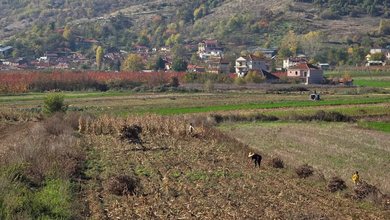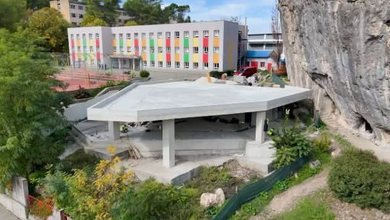
Albania leads by a wide margin the list of 45 countries with the highest percentage of immigrants in relation to the population in 2023.
According to estimates by the Organization for Economic Cooperation and Development (OECD), for every thousand inhabitants in Albania, 22.1 were immigrants in the 38 OECD countries, an indicator that places Albania well ahead of other countries such as Romania as the second country with 12.7 immigrants per 1,000 inhabitants, Bulgaria (11.9) or Cuba (10.6) (see graph below).
This high level of emigration means that nearly one in every 4 Albanians has emigrated abroad, reflecting the extraordinary magnitude of the demographic movement that has affected our country over the last decade.
Albania, unlike countries with conflicts or humanitarian crises, such as Syria or Afghanistan, is experiencing emigration motivated mainly by economic and social factors such as lack of opportunities in the labor market, low wages, rising living costs, and the perception of a better future abroad.
In the European context, the fact that Albania exceeds the regional and EU average several times indicates a continuous depletion of the active population, which is translating into a labor shortage, rapid aging of society, and pressure on social security systems.
While neighboring countries are managing to slow down the pace of emigration through economic growth, Albania continues to lose a large portion of its citizens to OECD countries, mainly Italy, Germany, Greece, and the United Kingdom.
This indicator turns emigration into one of the greatest structural challenges of the Albanian economy, with direct consequences on productivity, consumption and the long-term development of the country.
The main motive for emigration remains the low economic level. The average salary in Albania is still much lower than in the destination countries of Albanian emigrants, especially in Italy, Germany and the United Kingdom.
Although the economy has seen steady growth in numbers, this has not translated into a significant improvement in living standards for the middle and lower classes. High prices, unaffordable rents, and limited opportunities for well-paid jobs have pushed many young people and professionals to seek a more stable life abroad.
Another strong factor is the lack of perspective and trust in institutions. Many Albanians see emigration as the only way to achieve economic and social security, due to perceptions of corruption, lack of meritocracy, and political uncertainty. This is especially true for young people, who feel excluded from decision-making and professional development opportunities.
Structural depopulation is also linked to previous waves of emigration: Albanians who emigrated years ago are now attracting other family members through family reunification or employment contracts. This is creating a chain effect, where each new generation sees emigration as a natural way of life.
On the other hand, poor public services, especially in education and health, are causing the emigration of many educated families, who leave to offer their children a better quality education and career opportunities in Western markets.
If these trends continue, Albania risks losing a significant portion of its working-age population, making long-term economic growth and development more difficult./Monitor






















